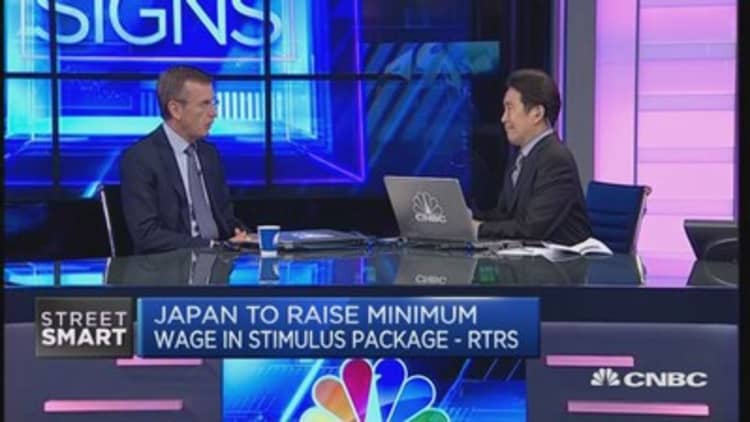Some members of the Bank of Japan's (BOJ) policy board believe that an output gap was one reason the country was taking longer to meet inflation targets, minutes of the central bank's latest meeting showed Wednesday.
Concerns about the output gap were not shared by the majority, but they highlighted a lingering worry that the delay in Japan meeting the BOJ's 2 percent target meant that its quantitative easing had been ineffective.
An output gap is the difference between what an economy is producing and what it could produce if operating at its most efficient. A negative output gap - when a economy is producing less than it could at optimum - indicates weak demand, which in turn can mean low inflation pressure.
"A few members added that the projected delay in the timing of reaching 2 percent had also been partly attributable to a somewhat slow improvement in the output gap," the minutes showed.
At the meeting on October 30, the BOJ pushed back the timing of meeting its 2 percent target by six months to the second half of fiscal 2016 due to weak oil prices. Two board members dissented from the bank's baseline scenario that inflation would reach 2 percent by 2017, exposing a rift between policy board members.

The majority view was the delay in hitting the target was due to weak oil prices, the minutes showed. Many members said Japan's inflation trend was improving as prices excluding fresh food and energy rose, the minutes showed.
Members also said underlying inflation was improving as the number of items in the consumer price index that were rising had started to outnumber the items that were falling, the minutes showed.
At a subsequent meeting on Nov. 18-19, the BOJ acknowledged that inflation expectations had weakened somewhat, which was another reason to question the impact of its large government debt purchases under quantitative easing.
Raising the minimum wage
Meanwhile, Japan will raise the minimum wage by 3 percent each year from next fiscal year as part of a package of policies targeting consumer spending and stocking economic growth.
The government will also strengthen policies to get more women into the workforce and ease regulations to encourage corporate investment, hopefully breathing new life into an economy that has struggled with patchy domestic demand.
The policies are also a positive development for the Bank of Japan, because it could lead to move private consumption and make it easier to guide inflation to its 2 percent price target.
"We need to ensure continuous economic growth supported by rising wages and the minimum wage must be included in this process," Prime Minister Shinzo Abe said.

